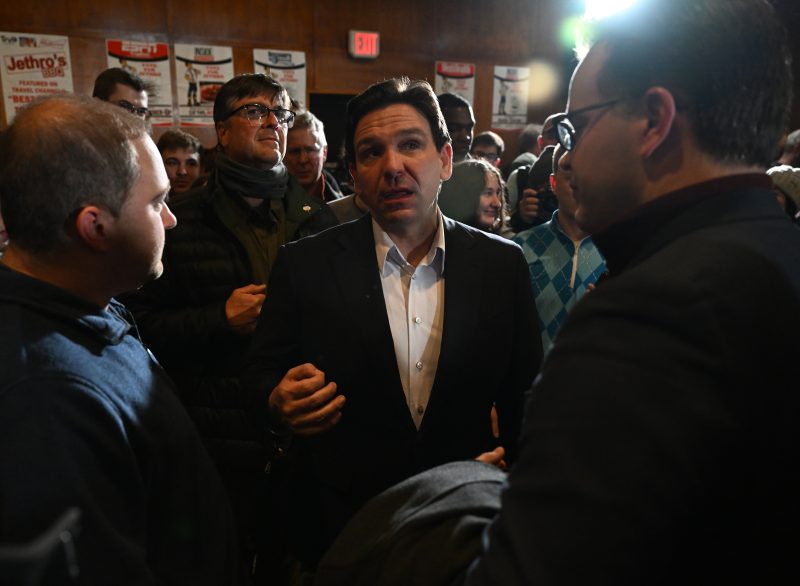DES MOINES — On the debate stage, Ron DeSantis denounced “warmed-over corporatism” and accused his opponent of “ballistic podiatry” — shooting oneself in the foot.
The Florida governor drew backlash last year for apparently warning fellow Republicans against becoming “listless vessels” following former president Donald Trump — a favorite phrase that few people besides DeSantis seem to use.
And on the campaign trail, he speaks the language of the online right with unusual fluency, whipping through terms like “central bank digital currency” (CBDC), environmental, social and governance investing, (“ESG”), and “shadowbanning.”
“We will re-constitutionalize the executive branch and we will bring this administrative state to heel once and for all,” he declared at his campaign kickoff speech in Iowa.
DeSantis’s at times esoteric political vocabulary reflects who he is as a presidential candidate: wonkish, cerebral and attuned to the leading edges of a conservative “war on woke,” which animates the GOP base but can fall flat elsewhere.
He is less inclined to make small talk about his personal life than strike up a conversation about policy — say, a recent Supreme Court decision with implications for pork production, which he once brought up while grilling with Iowa Republicans.
It also accentuates his stylistic differences with rivals Trump and Nikki Haley in a GOP presidential primary that has often revolved on personality and presentation rather than policy. DeSantis has been awkward in some one-on-one interactions with voters where other candidates might have seized a chance to show their personalities.
Trump, the heavy favorite to win the Republican nomination, uses simple and harsh language that has helped him convince many working-class conservative voters he is also an everyman who identifies with them, even though his name is associated with lavish wealth.
DeSantis, in contrast, pitches a Trump-like agenda with lofty metaphors (“the sacred fire of liberty”) and the call to “reconstitutionalize” the government, which he mentions frequently. (He does return again and again to some blunter catchphrases, such as how he wants to leave suspected drug traffickers at the border “stone-cold dead.”)
Where DeSantis denounces “transgenderism” and “woke-gender ideology,” Haley, a former U.N. ambassador and South Carolina governor, takes a softer, more conversational approach that’s attracted more moderate voters, appealing to “girl dads” about the importance of keeping boys out of female sports.
To some supporters, this is all part of DeSantis’s appeal. They want ‘Trump with brains.” Or they want hard-line stances on issues they say other Republicans neglect, interested in someone who shares their alarm at “vax mandates” and what DeSantis calls “the biomedical security state.”
While many Republicans have zeroed in on culture wars around race and gender, DeSantis most mirrors the language of conservative activists — warning about the perils of “cultural Marxism,” “woke ideology” and “social credit scores.”
DeSantis gets applause on the trail as he ridicules acronyms like DEI — diversity, equity and inclusion — which he says should instead stand for “discrimination, exclusion and indoctrination.”
“I like his attitude against wokeness,” Tim Donelson, a retired police officer in his 60s, said at a DeSantis event last year, suggesting that the Florida governor was more versed in the issue than Trump.
To other voters, however, that kind of language is confusing — or a turnoff.
“He’s really focused on a lot of cultural issues, and maybe not what I think is really important,” said Claire Funston, a 24-year-old factory worker who attended a Haley event in Spirit Lake, Iowa. A registered Republican who calls herself independent, she said she cares most about the economy and liked Haley best.
At a town hall in Waukee, Iowa, this month — just after the resignation of Harvard’s president — DeSantis riffed longer than usual on the changes he’s made to colleges in Florida, especially a small liberal arts school that he said was now modeled after a conservative Michigan school called Hillsdale College. He said he’d appointed conservative board members who eliminated DEI along with “critical race theory,” a term increasingly used on the right to describe a wide range of teachings on race they view as misguided.
He lingered for a while on the “accrediting bodies” that he accused of helping to push schools to the political left.
When the town hall shifted to Q&A, one woman said she hadn’t heard clearly and wanted to confirm: Did he say something about “predators” while discussing universities?
“Accreditation. Accreditor,” DeSantis clarified.
DeSantis also draws occasional attention for turns of phrase that are simply unusual or mark a throwback to the past. Some reflect his historical influences. At a CNN debate with Haley this past week, DeSantis echoed Ronald Reagan when he called for flying a “flag of bold colors” rather than “pale pastels.”
Another time, when he warned people against becoming “listless vessels that are just supposed to follow whatever happens to come down the pike on Truth Social” — Trump’s social media platform — it wasn’t a one-off for the former naval officer.
“We can’t graduate a listless vessel that has no idea of what American freedom is all about,” DeSantis said this spring. His wife, Casey DeSantis, has cautioned voters against politicians who “become listless vessels, bending in the wind” in D.C.
DeSantis talks less about “wokeness” these days than he did toward the beginning of the GOP race. But his opposition to it is still a key part of his political identity.
Returning to Clive on Thursday just ahead of the Iowa caucuses, DeSantis denounced the “ESG cartel.”

